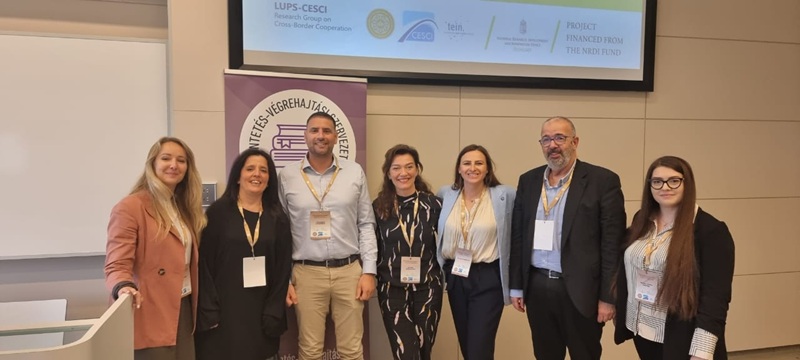
On May 12-14, 2025, Adriana Dróżdż, M.A., participated in the International Scientific Conference entitled. "What Future for the Concept of Borderless Europe? Perspectives of Border Policies and Territorial Cooperation in an Age of Multiple Crises," organized by the National University of Public Service in Budapest in cooperation with the Central European Service for Cross-border Initiatives (CESCI) and The Transfrontier Euro-Institut Network (TEIN).
The conference provided an important forum for sharing experiences and discussing the future of border policy and territorial cooperation in Europe in the context of contemporary crises such as migration, terrorist threats, the COVID-19 pandemic, the war in Ukraine and climate change.
The event was attended by representatives of academia, public administration and international organizations from countries such as Hungary, Poland, Germany, France, Italy, Spain, Iceland, Malta, Romania, Slovenia, Ukraine, Croatia, Belgium, the Netherlands, Norway, as well as Canada and Israel. The presence of experts representing a variety of research centers and public institutions underscored the high profile of the conference and its importance for international dialogue in the area of security and cross-border cooperation.
Adriana Dróżdż, M.A., delivered a paper entitled. “Green Rehabilitation Behind Bars: How Polish Prisons Are Embracing Environmental Initiatives,” presented during a panel titled “Environmental awareness and sustainability - Climate-neutral solutions for law enforcement, military and public administration in cross-border international practice.”
The presentation dealt with pro-environmental activities implemented in Polish penitentiary units, with particular emphasis on their importance for the process of rehabilitation, the formation of attitudes of environmental responsibility and the development of inmates' professional competence. It was also emphasized that the analyzed initiatives are in line with the Agenda 2030 and support the implementation of the Sustainable Development Goals (SDGs), which is important both from the perspective of environmental protection and building a more just, safe and socially and economically sustainable society. This approach is not only conducive to reducing the negative impact of penitentiary institutions on the environment, but also increases the chances of successful reintegration of inmates after serving their sentences.


